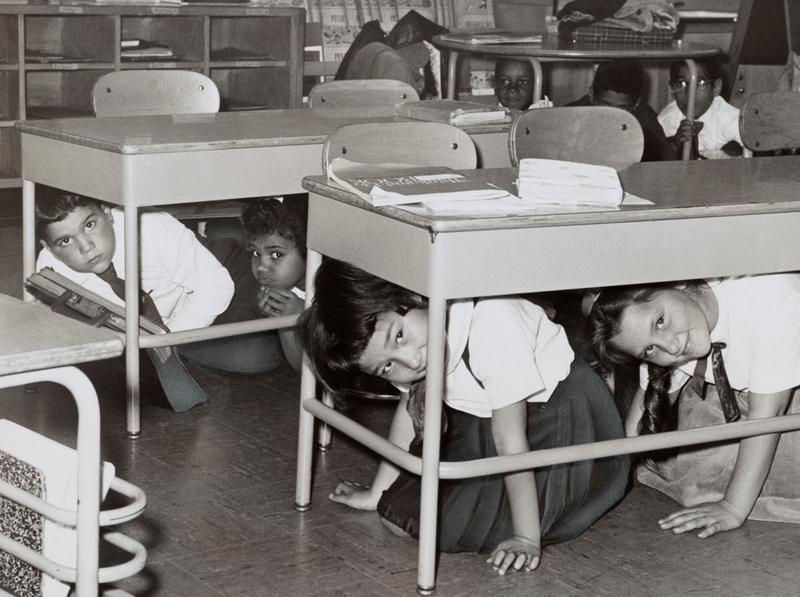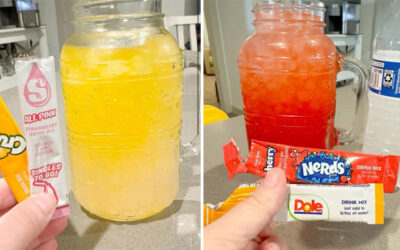If you have a school-age child, you may be worried about what active shooter drills may do to their mental health. These drills, although they are sadly necessary, can be terribly damaging to a child’s feeling of wellbeing. Parents need to know what to say and do.
I’m a contributing writer for Love and Marriage Blog, so I’m from another generation than most of you who have young kids. That said, I went through my own safety drills in the early 70s. Back then, the United States was always at the ready for the Russians to drop a nuclear bomb.

The shrill, alarm would go off and we’d be told to hide under our desk. If we were in the hallway, we were to sit down and cover our heads. Looking back it’s almost comical. A child’s desk was going to protect us from a nuclear bomb? Alrighty then.
My point? There have always been school drills for potential threats. I distinctly remember feeling a little afraid when we had a drill. But honestly, it was mostly the loud alarm screeching out of the blue that scared me. I say that to give you some hope. Here I am, having lived through it. I don’t have nightmares of those days. I’m hoping and praying it will be the same for your kids.
Of course, active shooter drills deal with a threat that’s far more real to all of us than a nuclear bomb was to me and my little friends. I get that. That’s why I went searching for answers about how to help kids feel safe in these scary times.
Active Shooter Drills: How to Help Your Kids Feel Safe
The information I’m sharing is directly from The National Association of Child Psychologists. I encourage you to consult a psychologist in your town if you feel it would better equip you to interact with your child about these drills.
First, let’s cover 3 questions you should ask of the school staff.
1. Ask your principal whether they announce the drills by saying some version of, “This is an emergency drill, not an actual emergency. This is a drill. We are now practicing how to keep safe in the event of an emergency. This is a drill.” The NACP says that’s very important. Kids shouldn’t worry there is someone actually coming for them.
2. “It is imperative that schools take into account the trauma history of persons participating in the drill. Special accommodations, such as advanced warning of an upcoming drill, should be given to any student or staff member who is judged to potentially find a lockdown drill frightening.” If you have a child with anxiety, or a special needs child, that must be taken into account. Make sure that’s the case.
3. Ask whether teachers understand how to use grounding techniques with kids who experience anxiety during these events. By the way, grounding techniques are wonderful for parents to teach their kids how to handle upsetting events of any kind. It’s a lifelong and incredibly helpful, healthy skill they can always rely on.
What to say to kids about active shooter drills.
1. Reassure them that they are safe. Talk about how glad you are to know their teachers are doing a good job of keeping them safe at school.
2. Watch and listen. The NACP says that kids won’t always come out with what’s bothering them. They suggest you watch for signs your child may want to talk. Are they hovering around you while you do dishes? Do their hand-drawn pictures raise any concerns for you?
If you notice your child’s sleep is fitful, their appetite changes or their attitude is different after a drill, consider asking for help from a mental health professional.
3. Only tell them as much as they need to know. Think of it as something akin to talking about the bird and bees. Keep it age-appropriate and answer only what they’ve asked. Don’t go further than you need to.
4. Remind them it’s brave to ask for help. It’s absolutely okay to say they are afraid and tell their teacher.5.
5. Keep kids away from the news. When a tragic event happens, do everything you can to prevent them from hearing about it. They definitely don’t need to know details. Those kinds of horrific events impact all of us, and we’re adults. Kids shouldn’t have to go to bed at night thinking about Sandy Hook the way parents often do.
6. Talk about how safe school is. They may find comfort to know there is an entire community of heroes who are always ready to protect them. (Firefighters, police officers, etc…) If your school has safety procedures in place, like secure entries, remind your kids how good you feel about that.
7. Sometimes people do bad things that hurt others. Kids know that. The NACP suggests talking about it, and how teachers and police are working hard to get people like that some help.
8. Talk about the dangers of guns and that they should never, ever touch one. Talk about violence in a way they can understand, and why it’s not okay and what to do instead when they feel angry.
Finally, let’s not forget what teachers are going through.
God bless the men and women who are there in our stead when these drills take place. Teachers should be paid FAR MORE than they are, and what they have to do in this case proves it.
I can’t imagine how hard it would be to have a drill with just me and my two grandkids. To think about one teacher trying to comfort and protect a classroom full of kids is mindblowing. Don’t let another day go by without telling your child’s teacher what she means to you. In the meantime, read this post from Governing.com about the anxiety teachers are suffering, too.
Sher Bailey is a writer in the Midwest who believes the power of humor, Mod Podge, and grandkids can fix most problems in life. You can find her at SherBailey.com.






I do not think that this can cause a problem, rather the pace of education and the involvement of children is falling very much and this is bad. Even in college, students often prefer sites like writemyresearchpaper.me or GPT chat over self-writing